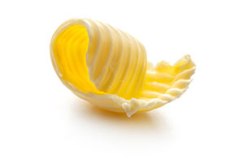Original post from Heart Matters
‘……………
“Butter unlikely to harm health, but margarine could be deadly”
– The Telegraph, 12 August 2015
The BHF’s view
This story was covered widely, in the Times, Telegraph, Independent, Sun, Express and others.
This was a literature review, published in the British Medical Journal, which combined the findings of many different studies from around the world looking at the link between eating saturated fat and trans fats and the effects on our health.
The review found a link between trans fats and heart disease. Trans fats are found in small amounts in foods like meat and dairy products, where they are naturally occurring, as well as being formed industrially when liquid fats and oils are turned into a solid through a process called hydrogenation. These are already known to have harmful effects on heart health, which is why in the UK virtually all of the artificially produced trans fats have been removed from foods that may have previously contained them, including spreading fats. While the amount of trans fat in the diet varies across the world, in the UK we consume well below the recommended maximum, which is 2 per cent of food energy.
Overall they did not find a link between eating more saturated fat and either cardiovascular disease (CVD) or overall death rates, though they acknowledged that the evidence was mixed and had some limitations. What they did find was some evidence that what you have instead of saturated fats made a difference.
Some studies showed that replacing saturated fat with high glycaemic index foods increased the risk of CVD, while replacing it with lower glycaemic index foods like fruit and vegetables, pulses and grains reduced the risk.
Replacing saturated fat with polyunsaturated fat was shown by some studies to reduce the risk of CVD. Most people in the studies who ate less saturated fat were eating more processed foods with a high glycaemic index (for example most sugary foods, pasta). So we don’t know how much these foods could have affected the results.
The Express headline: “Normal milk and butter safe to eat but low fat versions could KILL YOU” did not reflect the findings of the study. The study did not look at low fat dairy products. The headline writer may have been thinking of trans fats, but these are not found in low fat milk or in spreads, which in this country were reformulated a number of years ago to remove the artificially produced trans fats.
The Telegraph report was similarly confused, saying “Saturated fat found in butter, meat or cream is unlikely to kill you, but margarine just might… Trans-fats, found in processed foods like margarine raises the risk of death by 34 per cent.”
The Times pointed to cakes and takeaway meals as the foods high in trans fats, although it did acknowledge that their use has been reduced in recent years.
The Express said: “The verdict marks an astonishing U-turn on dietary advice,” implying that mainstream dietary advice has now changed, which is not the case.
There are several limitations of the research, in particular that the types of studies they looked at cannot prove that saturated fats or trans fats had the effects seen in terms of health, only that there are associations.
The researchers say that some of the studies they included may have suffered from measurement errors, including failing to take account of other factors such as age, smoking or family history. Most of the studies relied on the participants to record what they ate and drank, and these types of records are often not accurate.
The researchers said it is particularly difficult to measure trans fat intakes because the trans fat content of industrially-produced food tends to change often, especially as the studies happened while many countries were trying to remove trans fats from the food supply. It can also be difficult to classify trans fats as coming from processed foods or animal sources.
The researchers concluded that there are still unanswered questions, such as whether different types of saturated fats might have different effects on health, or how much of the results were caused by other nutrients in the diet.
There are many factors which cause coronary heart disease and no single food or nutrient is solely responsible for this Victoria Taylor, our Senior Dietitian, said: “The results of this review support existing guidance to avoid industrially produced trans fats. In the UK, industry action to remove these fats from manufactured foods means that our intakes are already below the recommended maximum 2 per cent of food energy.
“While saturated fats were not robustly associated with total or deaths from coronary heart disease (CHD), this does not mean we should all go back to eating butter – the studies that this review is based on can’t show cause and effect. Rather, it highlights how difficult it is to understand the true relationship between diet and our health.
“Diets high in saturated fat are linked to raised cholesterol levels, a risk factor for CHD. But when one nutrient is reduced it will be replaced by another and, depending on what this is, it can have positive or negative health consequences.
“It’s easy to forget that we need to consider our whole diet to reduce our overall risk. There are many factors which cause CHD and no single food or nutrient is solely responsible for this.
“We will continue to recommend switching saturated fat for unsaturated fat. This is consistent with a traditional Mediterranean style diet, which is a style of eating associated with a lower rate of coronary heart disease.”
- Read more about our advice on fats.
- Find out more with our list of surprisingly fatty foods.
- Learn about coconut oil and whether it is good for your heart. ………….’

